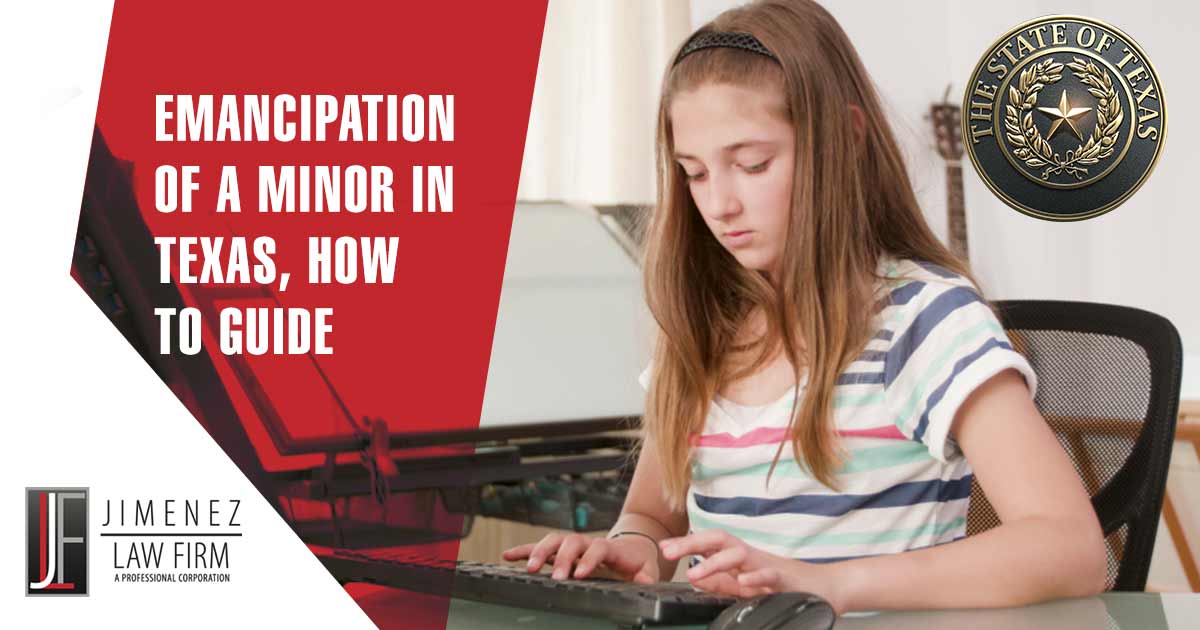There are certain situations when a minor may need to know how to apply for emancipation in Texas. In these cases, the minor wishing to have the legal capacity of an adult can petition the Texas courts for the “removal of disabilities of minority.” Today we’ll discuss how to emancipate a minor in Texas including eligibility, requirements, and the emancipation process.
How can a minor gain legal emancipation in Texas?
The Texas Family Code allows for emancipation in certain circumstances. Before petitioning to have the disabilities of minority removed, it’s important to understand the consequences of emancipation as well as the added responsibilities of the emancipation of minors in Texas. If you’re still interested in how to file for emancipation in Texas, you’ll want to speak with a qualified family law attorney familiar with these cases.
A minor can emancipate from their parents if they meet certain requirements and follow a specific procedure. Before we get into that, let’s further discuss who is considered a minor and what emancipation will mean for their future.
When is someone considered a minor?
A minor is an individual under the age of 18 who has not yet gone through the emancipation process. In the state of Texas, teenagers aged 16 and up can request emancipation from the court. Typically, parents look after their children until the minimum age of 18. Until the minor is legally considered an adult there are certain restrictions placed upon them and certain responsibilities the parents must meet when it comes to their care.
What does “disabilities of minority” mean?
Disabilities of minority is the term that refers to the restrictions imposed on a minor for their legal capacity. These restrictions prohibit the minor from being able to enter into contracts. It also limits their ability to make decisions regarding their medical care, educational, and financial choices. Typically, parents are responsible for these decisions until the minor child is legally considered an adult or becomes an emancipated minor.
What are the effects of being legally emancipated?
After the emancipation of a minor in Texas, when the minor’s disabilities are removed for general purposes, said minor then has the legal capacity of an adult. The emancipated minor then experiences the following abilities and effects of emancipation:
- Enter into contracts
- Consent to medical treatment
- Manage their income and estate
- Make educational decisions
- Make all legal decisions previously made by their parents or legal guardian
- Litigate without a guardian
This also means they’re now able to purchase a car or home, sign a lease on their own, get credit cards in their name, etc.
Can you drink, smoke, and vote if you’re emancipated?
While emancipated minors are now legally responsible for their decisions, there are some age-restricted privileges they are not granted when they become legally emancipated. These include:
- The ability to purchase alcohol, cigarettes, or lottery tickets
- The ability to vote
In order to be able to purchase and consume tobacco, an individual must be at least 18 years of age. And, in order to be able to purchase and consume alcohol, an individual must be at least 21 years of age. Individuals gain the right to vote when they become 18 years of age.
Can the court order a minor’s disabilities to be removed for specific purposes?
While most minors seek an emancipation petition for general purposes, there are some situations where the court orders a minor’s disabilities to be removed for specific purposes. Some examples of this include:
- Allowing a minor to enter into a specific contract
- Allowing a minor to consent to medical treatment
- Allowing a minor to enter into military service
Who can petition for emancipation?
For the Texas emancipation of a minor, the minor may file suit in their own name.
What are the requirements for removing the disabilities of minority?
The requirements for emancipation in Texas for general purposes are:
- The minor must be a Texas resident
- They are self-supporting and managing their own financial affairs
- They are 17 years old or 16 years old and living apart from any parents, managing conservators, or legal guardians
See the Texas Family Code Chapter 31.001
Where do petitions of emancipation need to be filed and what should be included?
The petition for removal of the disabilities of minority must be filed in the county where the minor lives. The petition must include the following items:
- The minor’s name, age, and residence
- The name and residence of each living parent
- The name and residence of the guardian of the person and estate, if applicable
- The name and residence of the managing conservator, if applicable
- The purpose for which removal is requested
- Why removal is in the best interest of the minor child.
A parent, managing conservator, or legal guardian must also participate by verifying the petition under oath before a notary. If said person is unavailable or unreachable then the minor’s amicus attorney or ad litem is next in line to verify the petition.
At this point, the court will appoint an amicus attorney or attorney ad litem to represent the best interests of the minor during the court hearing.
Where can I learn more?
You can learn more about legal minor emancipation from a family law practice specializing in these cases or the Texas State Law Library. Additional information is also available by contacting the Texas Youth Helpline.
The qualified lawyers at The Jimenez Law Firm are experienced with Texas law and legal emancipation. Our attorneys specialize in family law, child custody, child support, and divorce and are licensed to practice law in the state of Texas. Contact us by calling our office at 214-513-0125 or on our website. We’re here to help with any questions you may have in regard to your case. We’re here to support our clients and protect your rights.

